In today’s fast-paced digital environment, where competition in the real estate industry is intense, it is essential to maintain contact with prospective buyers, encourage prospects, and cultivate long-lasting client relationships. This is where email marketing comes in handy for real estate practitioners. As a real estate practitioner, harnessing the potential of email marketing can unlock a world of opportunities to expand your reach, strengthen your brand, nurture leads, and achieve exceptional results in your business.
Email marketing refers to sending targeted emails to a group of individuals who have been permitted to receive such communications.
Email marketing is essential to digital marketing strategies, enabling businesses, including real estate professionals, to communicate directly with their target audience and build meaningful relationships. This article will go through email marketing, the top email marketing platforms, and the methods you can use for email marketing.
Table of Contents
Importance of Email Marketing for Real Estate Practitioners
The importance of email marketing lies in its ability to deliver personalized and relevant content to subscribers’ inboxes. Unlike social media or other online platforms where algorithms determine content visibility, email marketing ensures messages reach recipients directly, providing a higher level of control and engagement. This direct communication channel allows real estate practitioners to boost leads, stay connected with clients, and build a strong brand presence.
Benefits of Email Marketing for Real Estate Practitioners
Email is vital for real estate agents to remain in touch with prospective buyers and build connections. Automated email marketing campaigns, known as drip campaigns, are highly effective in guiding leads through the sales funnel and generating 50% more sales-ready leads, also known as SQLs (Sales Qualified Leads). Here are some main benefits of email marketing for real estate agents and realtors.
Targeted communication
Email marketing allows you to segment your audience and send tailored messages to specific groups of individuals. You can interact with subscribers more personally by offering relevant information and listings depending on their interests, location, or stage in the real estate journey, improving the possibility of conversions.
Lead generation
By capturing email addresses through opt-in forms or lead magnets, you can build a list of qualified leads who have shown interest in your services; these kinds of leads are also known as MQLs (Marketing Qualified leads) Strategic email marketing can grow prospects give relevant information, and assist them through buying or selling, turning them into customers.
Relationship building
You can establish yourself as a recognized expert and create credibility with your subscribers by continuously giving useful material, market updates, and helpful resources through newsletters or similar mediums. This builds long-term connections as well as recurring business and recommendations.
Listing promotion
Email marketing helps you showcase your listings by providing detailed descriptions and including high-quality visuals in your emails; you can capture the attention of potential buyers or renters by directly contacting the prospective buyers that you have gathered.
Measurable results and analytics
Email marketing provides valuable insights into the performance of your campaigns. Through metrics such as open rates, click-through rates, and conversions, you can track the effectiveness of your emails and make data-driven decisions to optimize your strategies. This allows you to improve your email marketing efforts and achieve better results continuously.
Applications of Email Marketing for Real Estate Practitioners
In general, most real estate agents utilize email marketing to highlight:
Showing open houses
Emails are helpful for advertising open houses and new properties. These emails often incorporate videos or virtual tour links to enhance engagement and entice potential buyers. In addition, sending an open house newsletter invitation for a specific property or similar listings expands the reach and interest.
Offering neighborhood guides
Neighborhood guides provide information about nearby schools, attractions, and restaurants, showcasing the area’s appeal. This helps potential buyers understand the area’s lifestyle and makes them more familiar with different neighborhoods.
Sharing successful experiences
Testimonials from satisfied clients are powerful tools to generate new business and establish trust.
Showcasing marketing trends
Your real estate clients seek an agent with in-depth local market knowledge. You can use these emails to showcase market trends and relevant facts about home buying and selling in your neighborhood. Utilize charts and visually present the information to enhance its impact and engagement.
Sending property alerts
Property alerts are emails sent to home searchers who have signed up for property updates that meet their criteria. These emails are targeted and engage high-quality leads who are interested in your offerings.
Providing home buying and selling tips
Real estate professionals offer valuable advice and tips to help buyers and sellers navigate the real estate process. These tips include staging advice, negotiating strategies, financing options, and preparing homes for sale.
Sending market updates
This can include information on housing market conditions, price fluctuations, interest rates, and relevant statistics.
Sending event invitations
Agents may send invitations to open houses, property tours, seminars, or webinars to engage with their audience and generate interest in specific properties or educational events.
Providing exclusive promotions
Agents can provide exclusive offers or promotions to their email subscribers. This can include discounts on services, referral incentives, or limited-time deals.

How to Choose an Email Marketing Platform?
Several key factors must be considered when choosing real estate email marketing software. Here are some important factors to look for:
Ease of use
Email marketing platforms should be user-friendly and intuitive. The platform should have a clean and organized interface that helps you easily create and manage your email campaigns without requiring extensive technical expertise.
Contact management features
Ensure that the software provides robust contact management capabilities. Look for features such as list segmentation, contact tagging, and easily importing and exporting contacts.
Lead generation features
The platform should offer form editors and landing page builders to expand your subscriber list. By including an opt-in form on each page of your website, you can acquire many qualified customers leads. These new leads will be targeted with tailored emails designed for real estate buyers, leveraging their expressed interest in property purchases.
Template customization
Check if the email marketing platform offers a variety of customizable email templates suitable for real estate. The templates should be visually appealing and mobile responsive, allowing you to personalize them with your branding elements, images, and content. Customization options should be flexible and user-friendly.
Automation and segmentation features
The software should allow you to set up automated drip campaigns, welcome series, or triggered emails based on subscriber actions. Workflow features enable you to deliver timely and relevant content to your audience. Also, creating automated responses and segmenting email sequences are essential for effective real estate email marketing. The platform should help you provide more personalized and targeted messages to your audience by segmenting your list into groups based on specific criteria.
Some of the most common segmentations for the real estate industry are:
- First-time homebuyers
- Upsizing/downsizing homeowners
- Empty nesters
- Real estate investors
- Relocating professionals
- Luxury home buyers
- Rental property seekers
- Vacation home buyers
- Multigenerational home buyers
- New construction home buyers
- Divorced leads
- FSBOs and expired
Integration capabilities
Consider whether the software integrates seamlessly with other tools and platforms you use. Integration with your CRM system, lead generation forms, and website analytics can enhance your ability to track and manage leads effectively. Look for compatibility with popular platforms like WordPress, Salesforce, or Mailchimp.
Analytics and reporting
Ensure that the software provides comprehensive analytics and reporting features. It should offer insights into key metrics like open rates, click-through rates, bounce rates, and conversions. Robust reporting allows you to measure the effectiveness of your campaigns, make data-driven decisions, and optimize future strategies.
Compliance and deliverability
Verify that the software complies with email marketing regulations, such as GDPR, the European version of CAN-SPAM, or CAN-SPAM itself. It should provide features like unsubscribe management and opt-in confirmation to ensure you adhere to legal requirements. Consider the platform’s reputation for deliverability, as high deliverability rates are essential for reaching your subscribers’ inboxes.
Customer support
Evaluate the level of customer support provided by the software company. Look for resources like documentation, tutorials, and a responsive customer support team that can assist you in case of any technical issues or questions.
Pricing and scalability
Look for pricing plans that align with your needs and growth potential. Some software offers tiered plans based on the number of subscribers or features. So, choose one that suits your current requirements and can accommodate future expansion.
Mobile optimization
Optimizing your emails for mobile devices is crucial in real estate email marketing. As increasing users access their email on smartphones and tablets, it is essential to employ responsive designs that conform to various screen sizes. By using pre-designed, responsive email templates offered by top real estate email marketing software, you can enhance the user experience across all devices and improve open and conversion rates.
10 best Real Estate Email Marketing Platforms
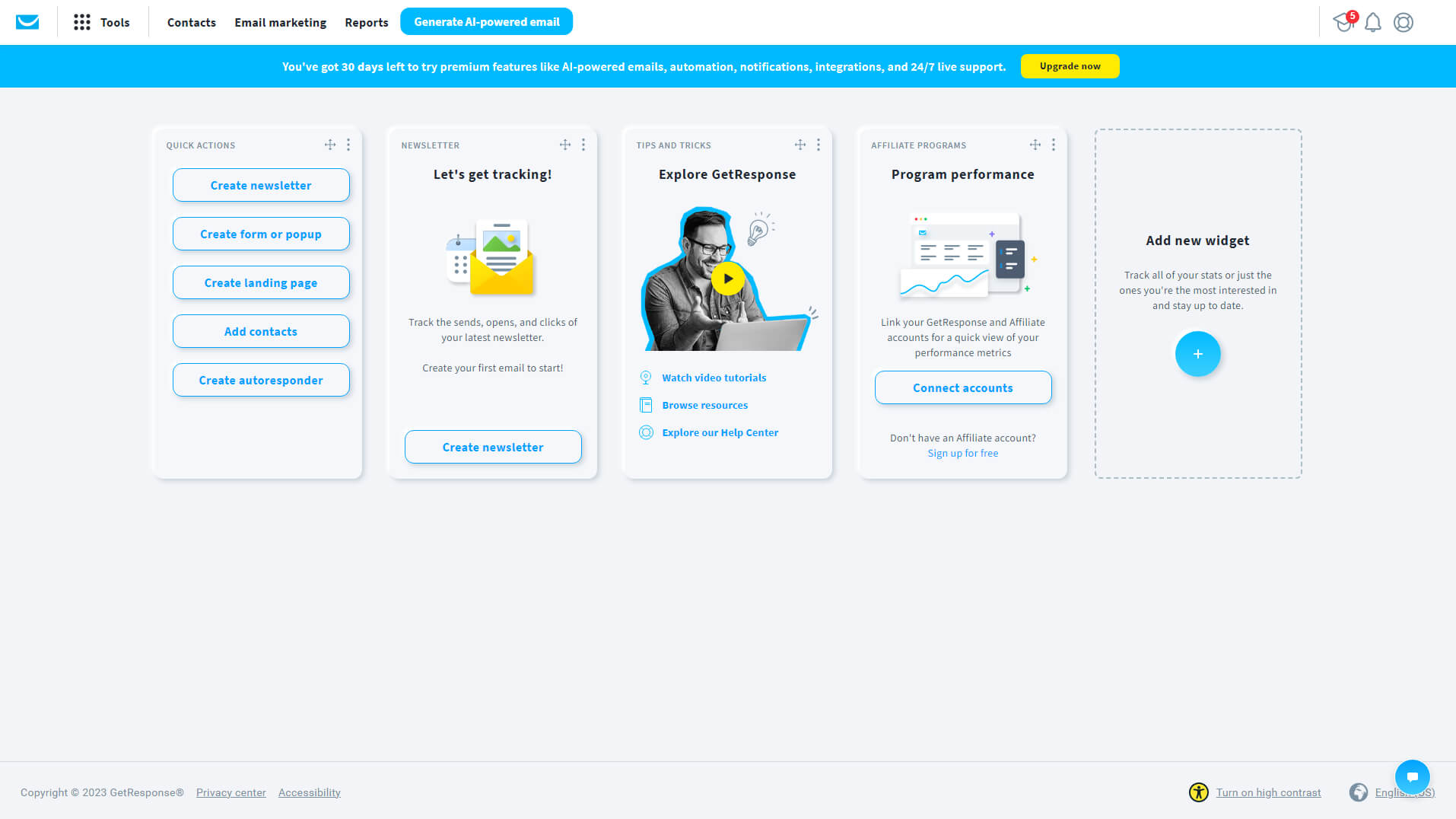
GetResponse
GetResponse is a popular email marketing platform offering various features to help real estate professionals streamline email campaigns. Here is an overlook of Getresponse’s pros, cons, and features:
| Best Features | Pros | Cons |
| More than 500 email templates | User-friendly interface | Few real-estate-specific integrations |
| Smart automation tools | Robust email automation features | Expensive prices |
| Drag and drop email builder | Easy email and website builder | No refund for yearly plans that are canceled. |
| Website builder | Good deliverability rates | |
| Webinar feature | Reliable customer support | |
| Landing page builder | Powerful list management tools | |
| More than 200 landing page templates | Integration with social media tools | |
| A/B testing for landing pages | ||
| Customizable landing page URLs | ||
| Different types of popup forms |
Pricing
Free plan
Access to lead generation tools, custom domain and unlimited newsletters for up to 500 contacts
Plans for solopreneurs and small businesses needs requesting a quote
Paid plans (1000 contacts)
- Priced at $19/monthly
- $16/month if paid annually
The prices can change depending on desired features, the number of team members, and the number of subscribers. You can see GetResponse pricing plans here.
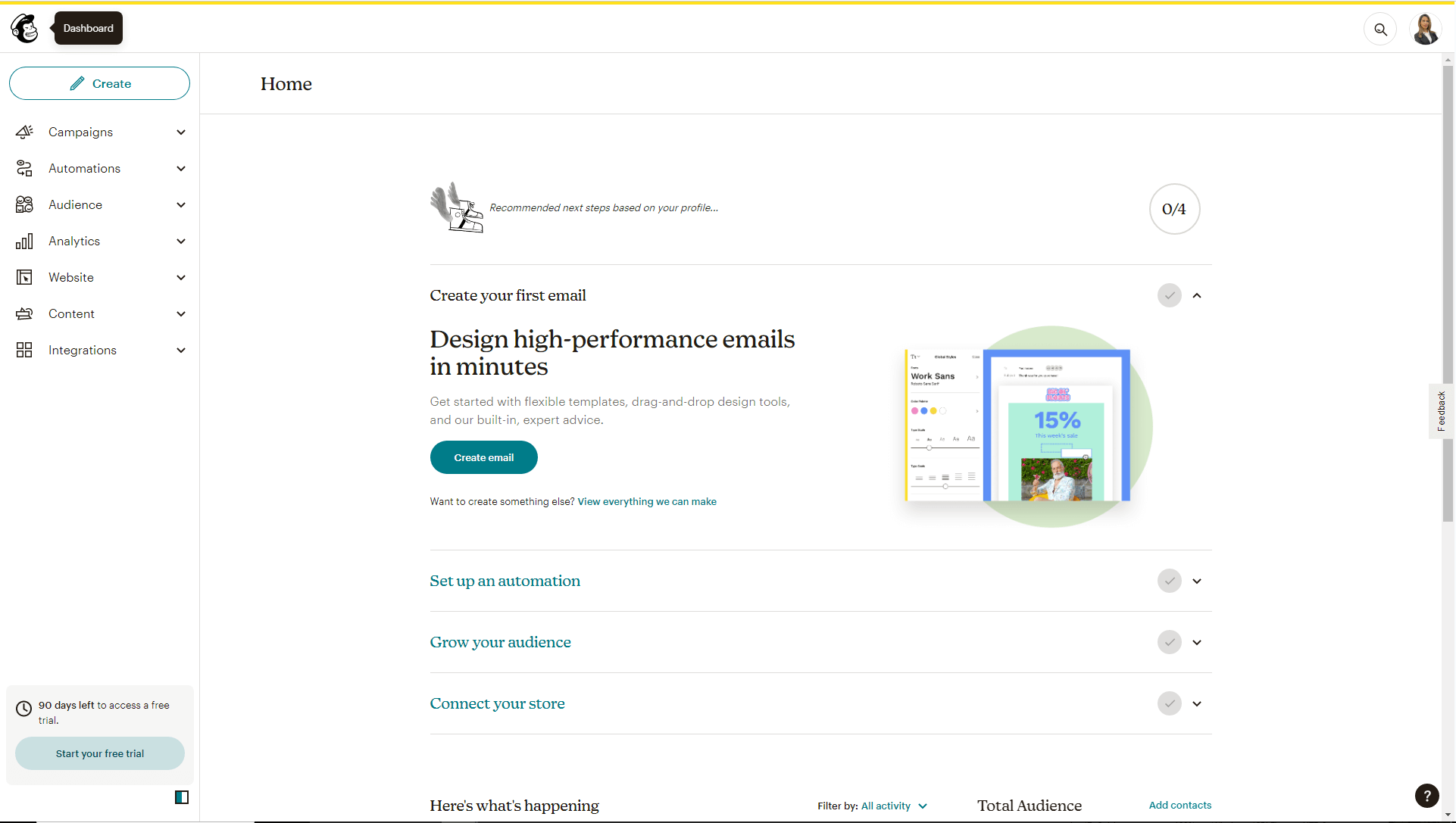
MailChimp
MailChimp is an email marketing platform that allows businesses to create, send, and manage email campaigns. It offers a range of features and tools, such as a flexible email builder and list segmentation option, and can integrate with different platforms.
| Best Features | Pros | Cons |
| Flexible email builder | User-friendly interface | Limited automation capabilities in the free plan |
| List management option | Wide range of integrations | Complex features for beginners |
| Automation | Drag-and-drop email builder | Advanced features require higher-tier pricing plans |
| Landing pages | Robust analytics and reporting | |
| Simple analytics and reporting | Mobile app for on-the-go management | |
| Integrations with WordPress, Magento, and Shopify | Free plan available with basic features |
Pricing
Free plan
- Basic features for up to 1000 monthly emails.
- Single-step automation, email templates, and marketing CRM.
- Limited reporting and support.
Essentials plan
- Priced at $13/month.
- Additional features include custom branding, A/B testing, and advanced analytics.
- Up to 5000 contacts
- 24/7 email and chat support
Standard plan
- Priced at $20/month.
- Includes everything in the Essentials plan, including advanced segmentation, retargeting ads, and custom templates.
- Up to 6000 contacts
Premium plan
- Priced at $350/month
- Additional features include advanced automation, multivariate testing, and phone support.
- Over 150,000 contacts
- Phone and priority support
You can see MailChimp pricing plans here.
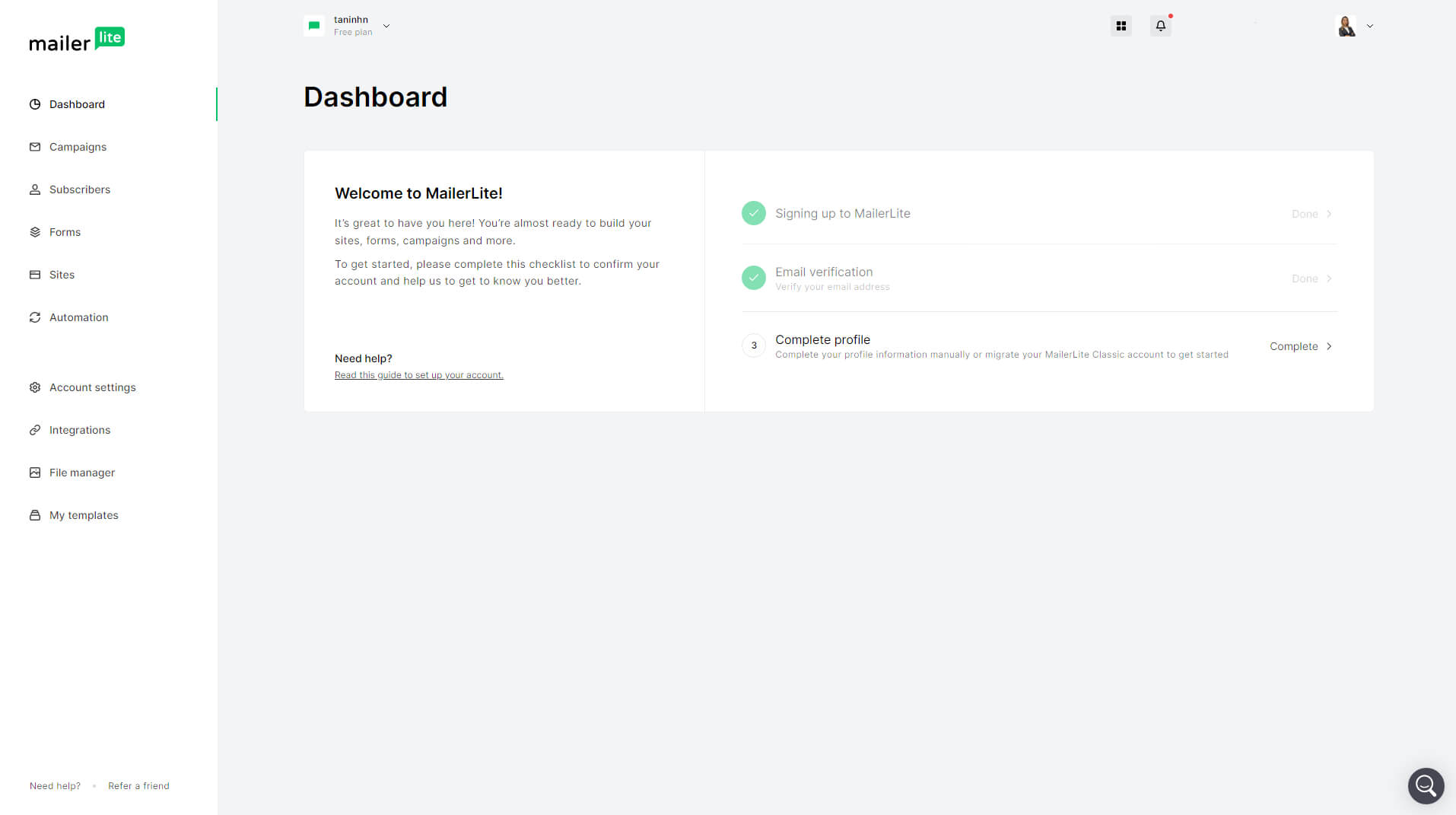
MailerLite
MailerLite is a user-friendly email marketing service that provides all the essential features to help you start sending real estate email newsletters.
| Best Features | Pros | Cons |
| Flexible email builder | User-friendly interface | Limited automation capabilities in the free plan |
| List management option | Wide range of integrations | Complex features for beginners |
| Automation | Drag-and-drop email builder | Advanced features require higher-tier pricing plans |
| Landing pages | Robust analytics and reporting | |
| Simple analytics and reporting | Mobile app for on-the-go management | |
| Integrations with WordPress, Magento, and Shopify | Free plan available with basic features |
Pricing
Free plan
- 12,000 monthly emails
- One user
- 24/7 email and chat support for the first 30 days
Growing business
- Priced at $9
- Unlimited monthly emails
- 3 users
Advanced plan
- Priced at $19
- Unlimited users and emails
Custom pricing
- Unlimited monthly emails
- Dedicated success manager
- Custom landing page design
You can see MailerLite pricing plans here.
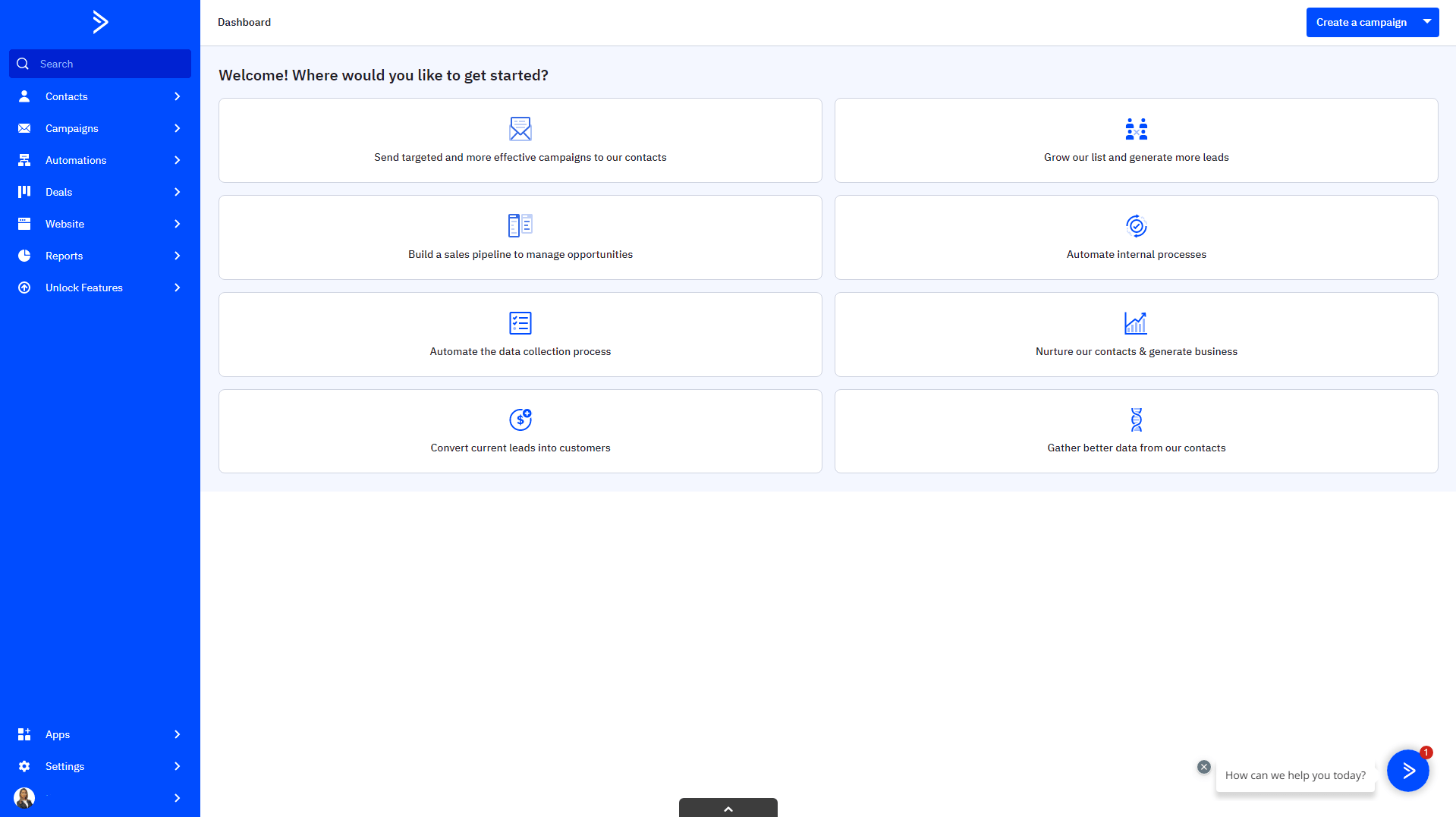
ActiveCampaign
ActiveCampaign is an all-in-one solution beyond email marketing and can even replace your CRM. With convenient list segmentation, a handy drag-and-drop editor, and beautiful email templates, it offers comprehensive features to streamline email marketing efforts and enhance customer relationship management processes.
| Best features | Pros | Cons |
| Visual automation builder | Fully-functional sales CRM for tracking leads and opportunities | Free trial, but no free plan forever |
| Built-in CRM with powerful list segmentation | Enhanced automation features | A little more costly than basic email tools |
| Time-zone-based delivery for optimized sending | Extensive reporting | For beginners, automation features take some time to learn. |
| Improved analytics and reporting | Flexible lead scoring system | |
| A/B Split testing | High email deliverability rate | |
| Extensive integration capabilities | Support of over 150 integrations | |
| More than 250 responsive email templates | Reasonable price | |
| Available in the Plus, Professional, and Enterprise plans | ||
| Lead scoring |
Pricing
Free plan
14-day free trial available to test the software.
Lite plan
- Priced at $9/month
- Email marketing automation, site tracking, and unlimited email sending
Plus plan
- Priced at $49/month for 1000 contacts
- Includes additional automation features, landing pages, and lead scoring
Professional plan
- Priced at $149
- Predictive sending
- Site messages
You can see ActiveCampaign pricing plans here.
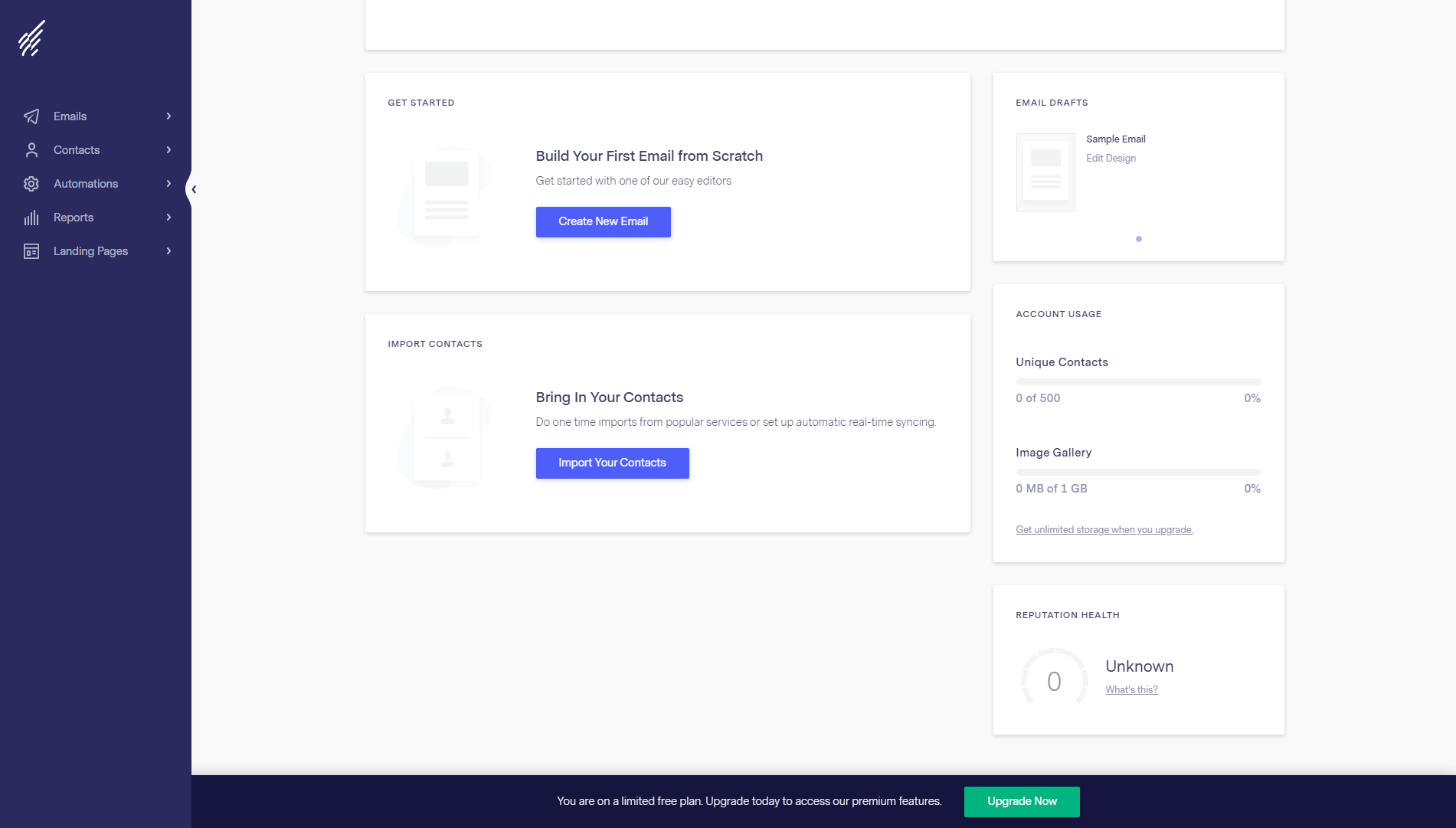
Benchmark Email
Benchmark Email offers a variety of email marketing resources to help you enhance your email campaigns and improve your overall email marketing strategy. It provides 300 responsive real estate newsletter templates and a range of free features, making it an attractive choice for beginners in email marketing.
| Best Features | Pros | Cons |
| Surveys and polls creation | Easy-to-use | Less Popup form templates |
| Popups and forms generation | Integration with 40 apps | |
| Drag-and-drop email builder | Free version with a lot of features available | |
| Automated email workflows | Affordable | |
| A/B testing | List verification and automatic list cleaning features | |
| More than 220 templates | ||
| List cleaner | ||
| List verification feature |
Pricing
Free plan
- 3500 emails/month
- Track email performance
Lite plan
- Priced at $8/month
- 3500 emails/ month
- Remove Benchmark branding
Pro plan
- Priced at $13
- 7500 emails/month
- Gather feedback with surveys & polls
You can see Benchmark Email pricing plans here.
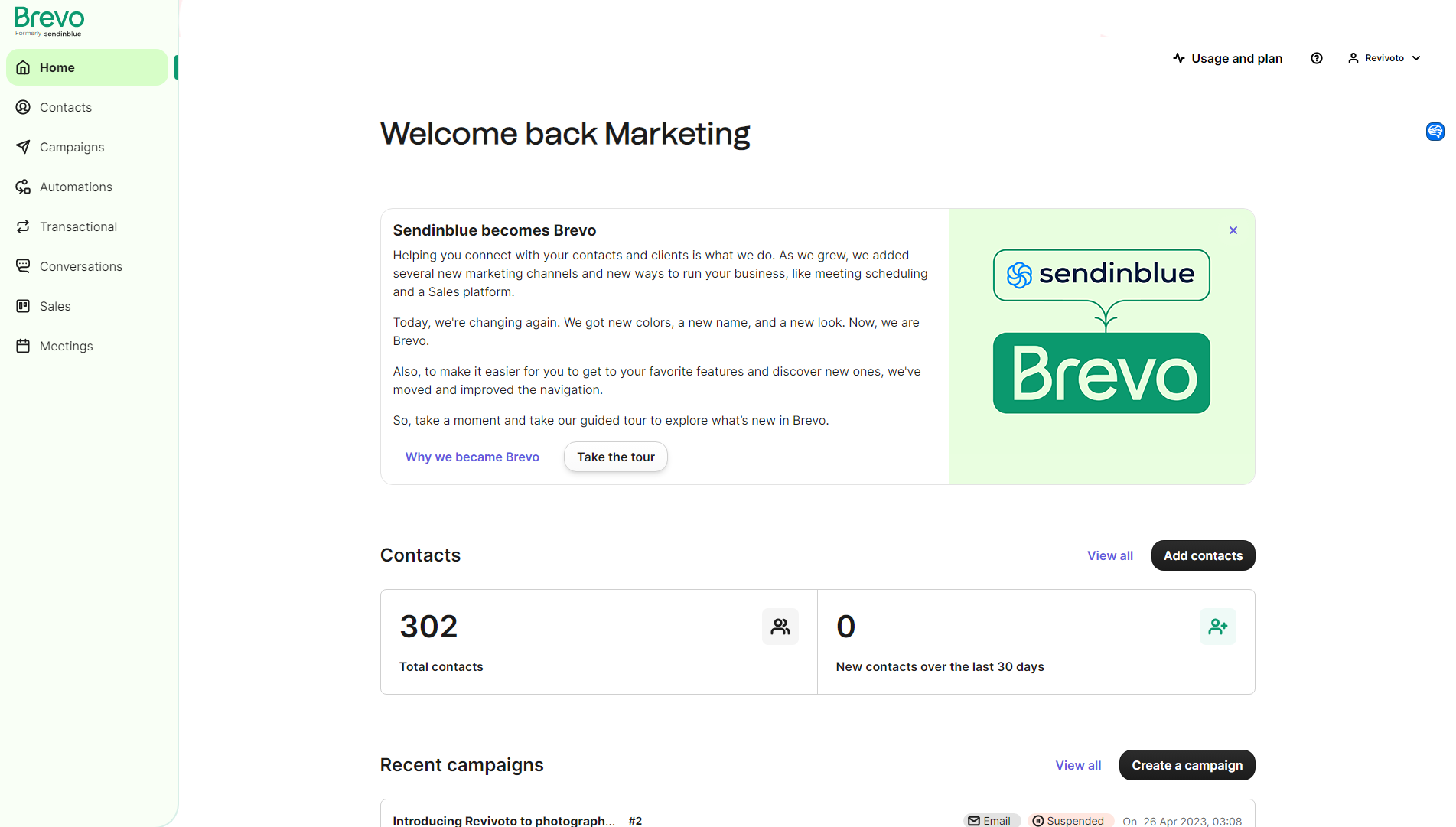
Brevo
Brevo, formerly Sendinblue, is a versatile email marketing solution suitable for businesses of all sizes, offering features such as stunning email templates and responsive customer support. It also provides a free plan that allows users to use their services until they reach 2.5k contacts in their mailing list.
| Best features | Pros | Cons |
| More than 40 customizable email templates | Comprehensive analytic | Complicated A/B testing email content |
| Automated email workflow tools | Easy-to-use email builder | Multiple users and user permissions for the Premium Plan |
| Landing page and sign-up form builder | Website chat and SMS features | |
| Drag and drop builder | Improved automation features | |
| Web chat and SMS feature | ||
| Email editor for beginners | ||
| Send-time optimization | ||
| Transactional emails feature | ||
| Email automation workflows |
Pricing
Free plan
- 300 emails/day
- Drag and drop editor
- SMS & WhatsApp campaigns
Starter plan
- Priced at $25
- Form 20k emails/month
- Email support
Business plan
- Priced at $65
- A/B testing
- Advanced statics
You can see Brevo pricing plans here.
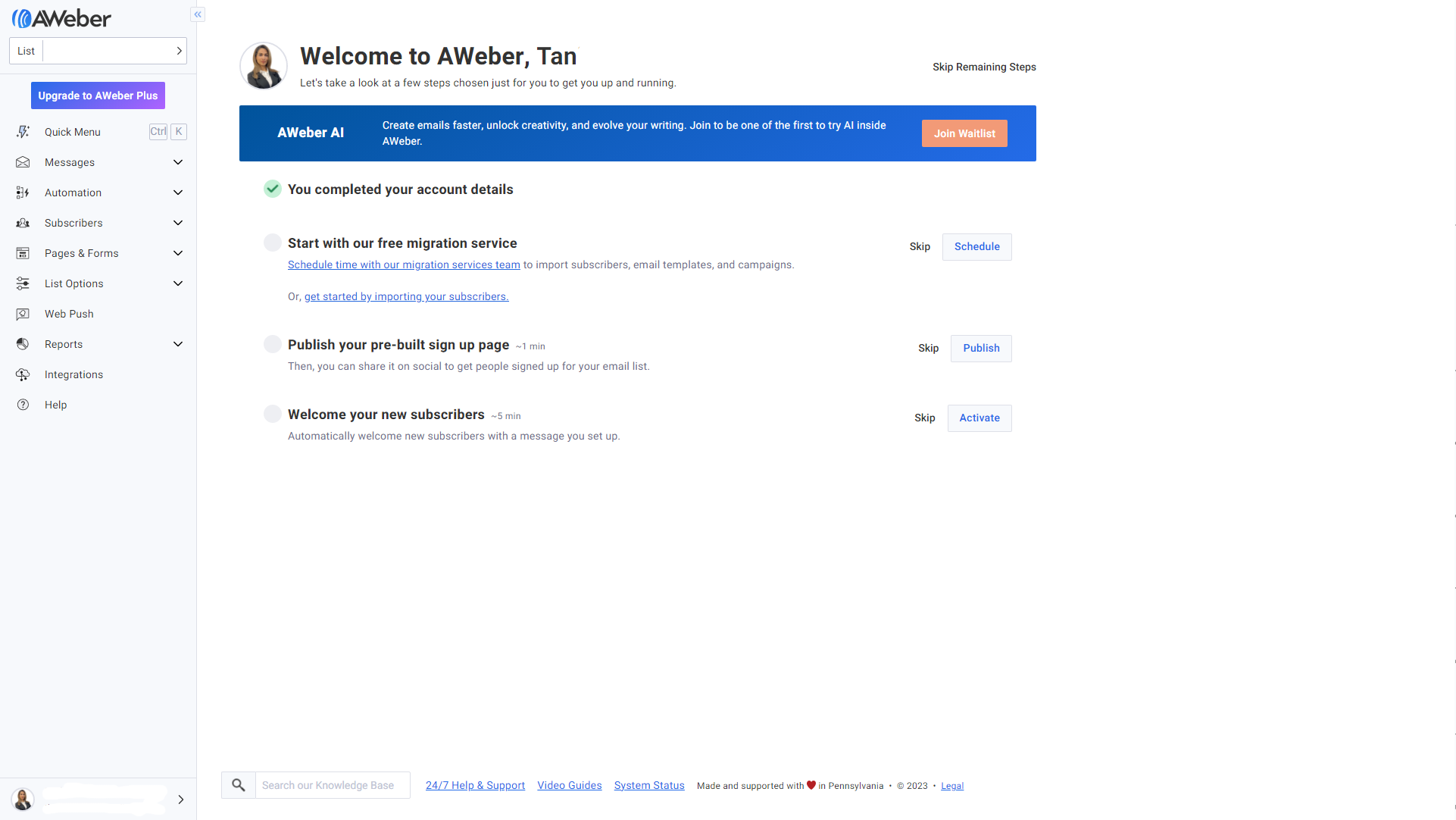
AWeber
AWeber offers a user-friendly experience, fast performance, and essential features that cater to the needs of realtors. AWeber is suitable if you’re primarily focused on managing drip sequences. It provides excellent email marketing analytics, allowing you to gain valuable insights. Additionally, AWeber offers a 30-day free trial, enabling you to evaluate the software before committing.
| Best Features | Pros | Cons |
| More than 700 pre-built templates | High email deliverability | Basic automation features |
| Drag-and-drop email builder | Superb customer support | old-fashioned templates |
| Advanced email analytics and reporting | More than 600 pre-designed email templates | |
| Autoresponder workflows and actions | Drag and drop email creator | |
| AWeber’s iPad app for lead generation at open houses | Clean analytics | |
| Landing page builder and sign-up forms | ||
| A/B Split testing | ||
| A/B testing |
Pricing
Free plan
- One email list
- 500 subscribers
- Basic templates
Lite plan
- 3 landing pages
- Priced at $12.50/month
- 3 users
- 24/7 support
Plus plan
- Priced at $20.00/month
- Unlimited email lists
- Unlimited landing pages
- Unlimited users
Unlimited plan
- Priced at $899/month
- Unlimited subscribers
- Advanced landing page features
- Remove AWeber branding
You can see AWeber pricing plans here.
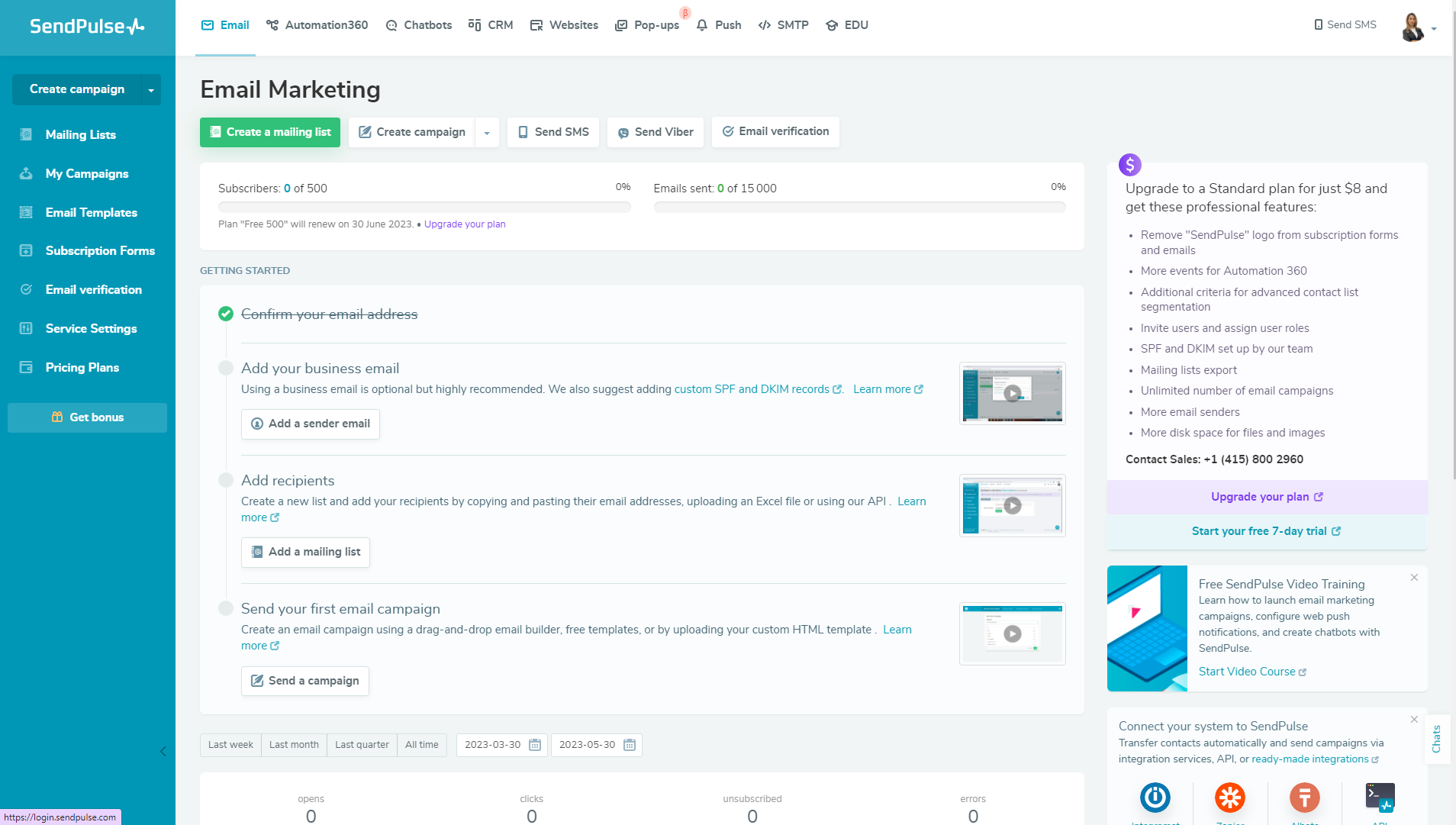
SendPluse
SendPulse provides a range of features, including customer segmentation, autoresponders with support for email series, SMS, and push notifications, automated scheduling, email tracking, and comprehensive reporting and statistics. However, it’s important to note that the list of integrations offered by SendPulse is relatively shorter compared to platforms like MailChimp.
| Best Features | Pros | Cons |
| Customer segmentation | Versatile autoresponders supporting multiple channels (email, SMS, push) | Limited number of integrations compared to some competitors (e.g., MailChimp) |
| Automated scheduling | Comprehensive email tracking and reporting | |
| Email series with autoresponders | ||
| Shortcomings in the number of integrations |
Pricing
Free plan
- 15,000 emails per month
- 3 sender email addresses/1 domain
- 1 landing page
Standard plan
- Priced at $8/ month- $76,80 per year
- Unlimited number of emails
- 5 saved segments
- 3 landing pages
Pro plan
- Priced at $9,60/ month- $92,16 per year
- 300 sender email addresses
- 10 landing pages
- 10 users per account
Enterprise plan
- Priced at $13,44/ month- $129,02 per year
- Full A/B testing
- Unlimited number of users
- Unlimited number of tags
You can see SendPulse pricing plans here.
IXACT Contact
IXACT Contact is a dependable real estate CRM and emails marketing system. Customers have praised the exceptional responsiveness and friendliness of IXACT Contact’s customer support and its user-friendly interface.
| Best features | Pros | Cons |
| Reliable real estate CRM and email marketing system | Easy-to-use interface | Limited third-party integrations |
| Robust customer support | Responsive and friendly customer support | Not as feature-rich as some competitors |
| Social stream | ||
| Direct mail marketing | ||
| Integrations |
Pricing
The IXACT Contact prices begin at $45/month and $38/month if paid annually, with each additional team member costing $24.95 per month. You can see IXACT Contact pricing plans here.
Omnisend
Omnisend is an effective email marketing instrument that facilitates omnichannel marketing. Its simple drag-and-drop builder allows you to create aesthetically attractive email campaigns quickly. Smart segmentation and automated email flows ensure your clients receive relevant messages through email, retargeting ads, or SMS. Whether you prefer to use Omnisend’s pre-built landing pages and pop-up boxes or create your own, it offers practical solutions for capturing emails and building your contact list.
| Best features | Pros | Cons |
| Powerful email marketing tool | Intuitive drag-and-drop builder | Integration options may be limited compared to other platforms |
| Omnichannel marketing accessibility | Smart segmentation and email flows | Limited customization options for landing pages and pop-up boxes |
| Beautiful email campaign creation | Ability to reach clients through email, retargeting ads, and SMS | |
| Pre-built landing pages and pop-up boxes |
Pricing
Free plan
- More than 60 SMS
- 500 emails
- Pre-built automation & workflows
- Unlimited segmentation
Standard plan
- Priced at $16/month
- 6,000 emails/month
- Unlimited web push
Pro plan
- Priced at $59/month
- Reach up to 500 contacts
- Unlimited emails
- Up to 3,933 SMS/month
- Advanced reporting
You can see Omnisend’s price plans here.
Steps for Creating Real Estate Email Campaigns
Real estate agents implement effective email marketing campaigns by following various steps. These steps include:
Building an email list
Real estate agents collect email addresses through opt-in forms on their websites and landing pages or by providing lead generators such as e-books, market reports, and property guides. They may also leverage social media platforms and other channels to attract subscribers and expand their email list.
Classifying the audience
Realtors should segment their email list based on criteria such as location, property preferences, or buying/selling stage to deliver personalized and targeted content, increasing engagement and conversion rates.
Determining the optimal schedule and frequency
ESP can determine your email campaigns’ optimal schedule and frequency. ESP analytics can provide insights into the most effective timing for achieving high open and click-through rates. The frequency of your emails should be tailored to the specific type of drip campaign you are running. For instance, a weekly schedule may be suitable if you send listing updates to sellers.
Creating compelling email content
Real estate companies should craft engaging and valuable email content such as market updates, expert tips and advice, property listings, relevant industry insights, and exclusive offers or promotions. They must show content that resonates with their audience’s needs and interests.
Choosing email templates
You have to choose a proper template, such as a welcome email template, a single listing promotion template, a multiple listing templates, and an educational email newsletter.
Designing visually appealing emails
Visual appeal is essential in email marketing, so real estate companies should invest in creating visually appealing email templates that align with their brand identity. They include high-quality property images, professional graphics, and a visually pleasing layout. Mobile accessibility is also crucial, as many people access their email on mobile devices.
Automating email campaigns
Real estate companies use email marketing automation tools to streamline and automate their campaigns, setting up drip campaigns or sequences to deliver pre-scheduled emails at specific intervals. Automation helps nurture leads, deliver timely content, and engage with subscribers.
Customizing
Real Estate uses subscriber data to personalize emails with recipients’ names, property preferences, and other relevant information. They also customize content based on the recipient’s stage in the buying/selling process or their specific interests, creating a personalized experience.
Tracking and analyzing performance
Real estate companies monitor the performance of their email campaigns using analytics tools. They track open rates, click-through rates, conversion rates, and engagement metrics to assess the effectiveness of their campaigns. This data helps them make data-driven decisions, optimize their strategies, and continuously improve their email marketing efforts.
Observing regulations
Real estate firms should observe email marketing restrictions and best practices. They obtain permission from subscribers, provide clear opt-out options, and ensure compliance with anti-spam laws and data protection regulations.
Since the CAN-SPAM (Controlling the Assault of Non-Solicited Pornography And Marketing) Act was issued in 2003, regulators have kept an eye on how practitioners utilize marketing efforts, including email marketing, to protect America’s consumers. Other than that, all over the world, lawmakers keep passing new laws and updating older laws to ensure consumers’ rights are protected.
Conclusion
With the growing reliance on digital communication, email marketing for real estate has become an essential tool for professionals to connect with potential buyers, sellers, and other industry professionals. By leveraging email marketing, real estate practitioners can showcase property listings, share valuable insights and resources, promote open houses, provide market updates, and stay top-of-mind with their target audience.


